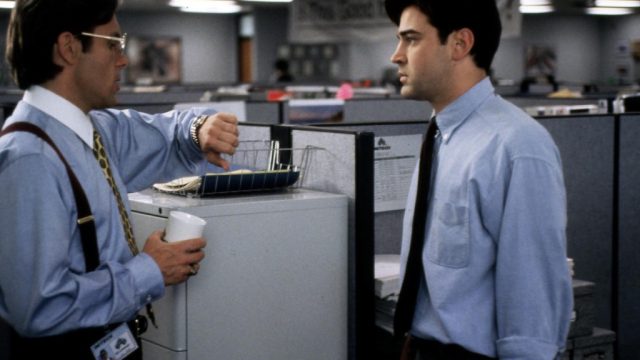17 Things Your Employer Doesn’t Want You to Know

Even the most amiable boss on the planet plays their cards close to the vest. Whether for professional reasons (they’re bound by HR standards) or personal ones (they’re just like that), there are some things higher-ups simply won’t tell you… until now, that is. Here are 17 snippets of classified info—straight from CEOs, SVPs, and other high-ranking members of the corporate world—that top brass doesn’t want you to know.
1
The little things don’t matter nearly as much as you’d think.

If you’re naturally a follower of rules, you might not want to hear this: For many employers, everything from the time you come to work to the nitty-gritty specifics of your job responsibilities are more gray area than they might appear.
“Bosses are not that crazy about making sure you come on the dot, or that you leave on the dot, or that you fold the papers a certain way or talk on emails a certain way,” says marketing consultant Karla Singson. “We care more about getting things done and making customers (or our other, bigger) bosses happy, and we will be thrilled to hear your suggestions on unconventional ways to make that happen.”
According to Singson, as long as you help get those big picture tasks done, the rest of the rules don’t matter as much. Whether you answered every email or left at 5:55 p.m. is far less important to your employer once the things they actually care about are handled.
2
They’ve probably cyber-stalked you.

This happens more during the hiring phase, but you should know that, if your Facebook, Twitter, and Instagram accounts are public, there’s a good chance your employer has taken a look at them. According to a 2018 CareerBuilder survey of 1,000 hiring managers, 70 percent use social media to screen candidates during the hiring process.
But it doesn’t end there: Nearly 50 percent continue to periodically peek at employees’ social media—and a full third have found stuff online that have caused them to admonish (or even fire) an employee. Set your accounts to private, folks!
3
How you interact with others makes a difference.

Whether you’re out for a company lunch or happy hour, your boss is still your boss, and they’re going to take notice of how you interact with others. The same way a first date might note how you treat the waitstaff at a restaurant, your boss will, too.
“I always pay attention to how employees interact with strangers, whether it’s a janitor, waiter, or pedestrian on the street,” says Matthew Ross, co-owner and COO of mattress review website The Slumber Yard. “It’s very telling whether the person is nice, conversational, and funny, or whether they’re awkward or rude. I know this might be a somewhat odd situation or behavior to pay attention to, but it tells me whether the particular employee possesses the soft skills necessary to move up to a managerial role.”
4
Vacation time means just as much to your boss as it does to you.

The best part about your vacation may be that you don’t have to deal with five-alarm emails from your boss. But believe it or not, the feeling is mutual. Your boss values their time off as much as you do, if not more.
“We give our employees extensive paid time off over the Christmas and New Year’s break. We tell them it’s a reward for working so hard throughout the year, but the truth is my business partner and I do it because we usually schedule our own big vacations during this time period,” says Ross.
5
Your attitude matters as much as—and maybe more than—your skillset.

You can be trained to learn or improve upon new skills. You can’t be trained to have a new personality. Your boss wants to enjoy coming to work, and the personalities of those who work under them are a major factor in that. If you’re a likable, friendly presence, your boss is going to give you more leeway, and more opportunities than if you come across as dour or antisocial. An amiable, easygoing spirit can go a long way.
“There’s a popular business saying that you should hire for attitude and train for skills,” writes Allison Green, the author of Ask a Manager: How to Navigate Clueless Colleagues, Lunch-Stealing Bosses, and the Rest of Your Life at Work. “The thinking, of course, is that you can train someone to sell your product or use a software program, but you can’t train them to be warm and friendly to customers, or communicate well, or take initiative, or have a work ethic—so you should hire for that untrainable stuff and then train them to do what you need.”
6
Your boss doesn’t want to have to hold your hand.

Some people are true-to-form self-starters. Others need frequent prodding from a higher-up as motivation. But “you can’t ask your boss to check in on you daily,” writes Green. “That’s making [them] responsible for you staying on top of your work in a way that you really need to do yourself, adds to [their] own workload, and risks communicating that you can’t handle those pieces of the job.” Instead, if you need that fire under your feet, Green suggests meeting weekly.
7
Your boss also likes socializing—for a little bit.

Bosses are human, after all, and would probably rather be out doing something else—just like everyone else on staff. So, every now and then, take the time to find out about their hobbies, and favorite bands or movies, and don’t be afraid to ask what they got up to on the weekend. “It’s important to be social in your office and build relationships,” says Anthony Fletcher, CEO and founder of executive search firm My Future Consulting.
Still, a job is a job, and you don’t want to veer into long chats that will hamper productivity. “Remember people are also working,” says Fletcher. “Popping by someone’s desk and launching into a 30-minute meaningless conversation can be very disruptive to someone else’s workflow.”
8
You’ll lose points if you’re on your phone too much.

Sure, smartphones have become a ubiquitous part of office life. But that doesn’t mean your boss wants to see you texting during a meeting or scrolling through Twitter at a work event. In this multiscreen age of distraction, employers still expect to have your full attention when you meet face to face, and that means keeping your phone in your pocket and on silent when you’re chatting with the boss.
“Simple things like forgetting to put your phone on mute during a conference call can create a lot of unnecessary distraction,” says Fletcher. “You don’t want to be known as the person in the office with the barking dog.”
9
They notice when you’re on a break.

You might think your boss has more important things to do than observing the exact moments you’re away from your desk, but, even if they don’t point it out, they’ve likely taken note.
“Managers notice what time people arrive and when they leave,” says Fletcher. “This doesn’t mean you need to be the first one in and the last one out, but don’t be the person who arrives 30 minutes late and immediately goes out for coffee and donuts or takes an extended lunch.”
10
Don’t expect them to catch all of your mistakes.

A good boss has a keen eye and can spot errors with hawk-eyed precision. But that doesn’t mean they’ll catch everything. Especially as your employer grows to trust your judgement and decision-making, they’ll be more likely to assume that you’ve got it covered without them having to thoroughly check your work. While that’s great for your prospects (hello, eventual promotion), that also means you have to be extra, extra careful when it comes to double-checking your work. Better safe than sorry!
11
They’re just as worried about screwing up as you are.

One of the biggest worries most employees have is that they’ll mess something up and disappoint or irritate their boss. Turns out, the boss has those exact same concerns about their own job performance.
“I’m constantly afraid of messing up,” says Joseph Flanagan, an HR manager at engineering company Tacuna Systems. “Handling numerous employees can be very scary, especially if they all work in different fields that are alien to me. It’s my job to get them to do their jobs, but I have absolutely no idea how to do their jobs.”
12
But they’re open to critique (if it’s done correctly).

Second-guessing your employer’s decisions is not the best way to put yourself on the fast track to a promotion. But that doesn’t mean a good boss is not open to some constructive criticism. The key is to do it in the right way. Thankfully, as Nicolas Gremion, the CEO of Free e-Books, writes, it’s not as difficult as it seems.
Just be sure to pick the right time (i.e., when they’re free, and when they’re cheery) and come armed with data to back-up any points. Finally, you should always be ready to stand down—even if you’re convinced you’re right. The boss is still the boss, after all.
13
Yes, some managers gossip.

Most good managers like to stay above the fray. Chiefly, that means one thing: No gossiping! Still, from time to time, it happens. And if you see it, watch out. As Liz Ryan, a former senior vice president of HR at Fortune 500 companies, writes for Forbes, “[Any manager] who will gossip to you will just as easily gossip about you.”
14
There’s a good bet they’re making educated guesses.

You might imagine that your direct supervisor is steeped in years of wisdom and work experience. But that’s not always the case. In fact, they very well might be fumbling in the dark as much as you are (just faking it better). “New supervisors are promoted with little thought, given little to no training, and then put in charge of other people,” writes Ryan.
In other words, you have more influence over their decision-making than you realize. If you have a thought or idea, speak up. The right piece of information or suggestion at the right time can give them enough confidence to decide on one direction over another, and it could be you that makes that difference for them.
15
Posture matters.

You don’t need us to tell you that body language often makes a bigger impression than verbal language—and that goes doubly for how you sit from 9 to 5 (or later). As Lillian Glass, a body language expert and communication consultant, told Time, slouching at your desk makes you look less “competent” than those who sit up straight—and that certainly won’t help come quarterly reviews.
We know that keeping your spine straight as an arrow for hours a day is easier said than done. But there’s an easy solution: Get a standing desk. Then, try to stand for 30 minutes for every hour you sit. This trick will do wonders for your spine—and for your overall health.
16
You aren’t friends.

Yes, it’s valuable to cultivate a good relationship with your higher-ups, but don’t think for a second you’re pals. There are exceptions, of course, but even the most friendly employer-employee relations should not be mistaken for actual friendship. You aren’t two equals—your boss is still your boss, and is the one holding more power in the relationship. If that’s not a recipe for a disastrous personal relationship, we don’t know what is.
17
But you have more power than you realize.

It’s important to remember that your bosses need you more than they let on. Even if you feel like things are unsteady, chances are, you’re safer than you think. Maybe you have a personality that jibes with the rest of the team. Maybe you have a learned set of skills, and it would be a pain to train someone from scratch. Or maybe your C-suite just doesn’t want to go through the often labyrinthian process of recruiting a replacement employee. In any case, you almost certainly have more leverage than you realize in the relationship. Don’t forget it. And if you want to keep things copasetic at work, here are 40 Things You Should Never Say to Your Boss.
To discover more amazing secrets about living your best life, click here to follow us on Instagram!